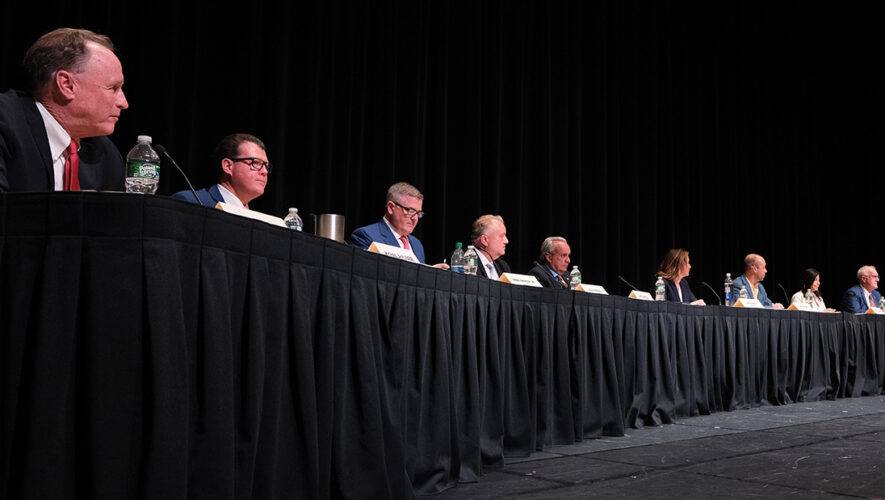Local legislators split on backing legal weed law
By DAVID NAHAN/Sentinel staff
CAPE MAY COURT HOUSE – State Sen. Michael Testa and his Assembly District 1 colleagues all voted against the legislation regulating New Jersey’s marijuana industry after voters approved making recreational marijuana legal in the November election.
Testa and Assemblymen Antwan McClellan and Erik Simonsen were among those casting no votes Dec. 17.
In the Assembly, the vote for the bill – “New Jersey Cannabis Regulatory, Enforcement Assistance, and Marketplace Modernization Act” – was 49 to 24 with 10 not voting. All 24 legislators voting no were Republicans.
In District 2, covering most of Atlantic County, Democrats John Armata and Vince Mazzeo voted for the bill, which “legalizes personal use cannabis for certain adults, subject to state regulation; decriminalizes small amount marijuana and hashish possession; removes marijuana as Schedule I drug.*
In the Senate, the vote was 23-17. Testa and District 2 Sen. Chris Brown were among the no votes.
The law
The bill decriminalizes possession of as much as 6 ounces of marijuana, but does not allow individuals to grow it themselves. It also does not allow for arrests for selling up to 1 ounce of marijuana.
Sales will be taxed at the state sales tax rate of 6.625 percent, but there is an excise fee of $10 per ounce if the price is at least $350 per ounce, $30 per ounce if the fee is between $250 and $349 and $40 if the price is below $250 per ounce. The fee goes up to $60 per ounce if the price falls below $200.
According to the Tax Foundation, a national independent tax policy non-profit, localities can add an optional 2 percent tax at different stages – cultivation, manufacture, wholesaling and retailing. Those can “pyramid,” according to the foundation, all being added on at different stages with the total end cost foisted onto the consumer.
The legislation also sends 70 percent of the tax revenues raised by the sale to communities that have been disproportionately targeted with marijuana possession arrests to be used for community programs.
The bill notes New Jersey spend $127 million annually to enforce marijuana laws and that Black residents are three times more likely to be arrested for possession than white residents even though their usage is about the same.
The bill adds consumption of marijuana to driving under the influence of alcohol statutes, meaning drivers cannot legally operate a motor vehicle while under the influence of marijuana and passengers in a vehicle cannot partake while in the vehicle.
The state is going to create a five-member Cannabis Regulatory Commission to oversee legal marijuana sales, with members paid $125,000 ($141,000 for the chairman). It may be many months before legal sales to adults 21 and up begin as the marketplace is set up.
Local opposition
Testa said he opposed the bill because the way it is set up, the taxes and fees will make the price so high it won’t be a benefit to the state.
“The voters of this state overwhelmingly approved of this measure and the taxes being included in the marijuana bill that was passed yesterday (Dec. 17) were not contemplated in their vote at all,” Testa said Friday. “I think it warrants a challenge to these new taxes as it was not contemplated by the referendum measure that was on our ballots this past November.
“Additionally, I think the entire point should have been with marijuana legalization to make it more affordable than the black market so the black market would be eradicated. With these taxes and fee structure, the black market is only going to grow, in my estimation.”
He said the cost per ounce of marijuana “sounds awfully expensive to me and I think it is going to disincentivize people to purchase legal marijuana from a dispensary and they’re going to turn to the street just like most marijuana users have been prior to this legislation.”
McClellan, of Ocean City, said in an interview the week before as the bill was being discussed that it did not have a provision to use revenues from marijuana sales to provide tax relief to New Jersey taxpayers nor did it have an educational component.
“I believe there should be some money going back to the taxpayers for some tax relief. If this is going to be a big thing with money available, then that money should go back to the taxpayers … and we’re not seeing any relief out of this,” he said.
“I would like to see some education,” he added. “You have underage drinking so you’re going to have underage people smoking marijuana. So some money should be going back to educate those folks on that and there’s not anything in there right now that’s going to be doing that.”
Testa echoed that concern.
“I certainly don’t want this to turn into a product that becomes more attractive to people under the legal age. I remember there was a study when I was in college that Joe Camel (a cartoon character hawking Camel cigarettes) was more recognizable to first-graders than Mickey Mouse. I certainly don’t want that to be something that becomes more and more attractive to children that are under the age of legal use.
“I see some of the cannabis products that are gummies and other things that look like they are candies. I want to make sure that children are in fact protected,” Testa said.
He believes the bill that was approved is going to be problematic.
“Look, the people of New Jersey spoke. They spoke very loudly this past election,” he said. “The people want this to be legal so any opposition to its implementation … (but) I find the legislation as it currently stands is overly burdensome in its tax structure. I think what should have been an easy lift for our Legislature, we’ve overcomplicated things and instead of eradicating the black market we are reinforcing the black market.”


